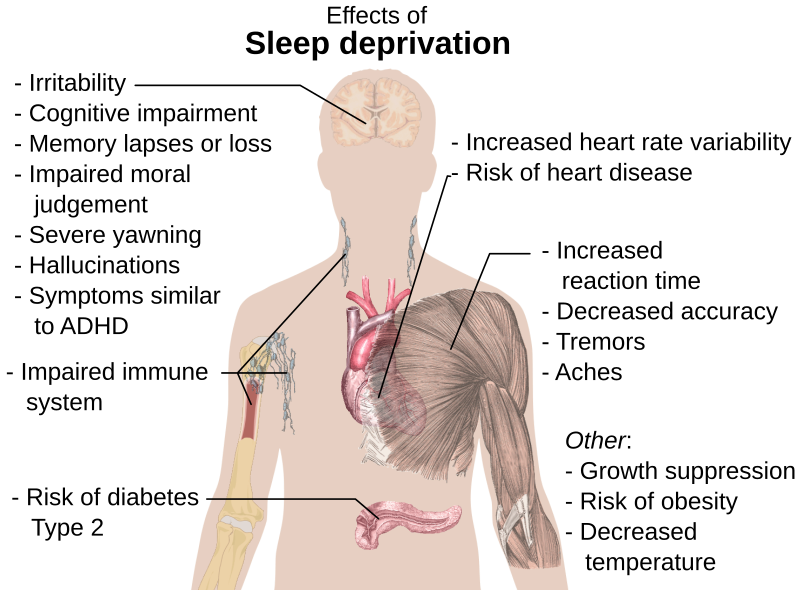Are You Sure Your Bedroom is The Best Setting for Your Sleep?
Sleep deprivation is pretty common these days—it's a major attribute of accomplishment-oriented societies—but why would anyone have a beloved-hate relationship with it? Usually, 1 would say,slumber impecuniousness and all the accompanying symptomsare the definition of a love-hate human relationship, to the core.
Let me tell you something: y'all canuse sleep impecuniousness for your ain benefit. Nosotros'll go into how this works, just offset, let's discuss the phenomenon of sleep, slumber deprivation and its symptoms, and finally design a "how to" experiment about sleep deprivation(unremarkably known as self-torture), and ask ourselves, more chiefly, why?
Sleep: Functionality
"Slumber is a naturally recurring state characterized by reduced or absent consciousness, […] and inactivity of nearly all voluntary muscles." (Macmillan, 1981). This is a brusque and articulate explanation:
- sleep is characterized past slumber stages/cycles (five cycles, differing in depth)
- the deeper your sleep, the better the quality of sleep
- More Sleep ≠ Better (healthy avg. seven.v-9 hours)
The functions of sleep are very multifaceted and majorly unexplored, but these (validated, and normally accustomed) aspects involvement us the near correct now. Sleep has a major impact:
- on our memory and the power to re-organize thoughts, experiences and to acquire new things (neuroplasticity)
- on the regulation of necessary hormones and the power of our body to regenerate physically
What is Slumber Deprivation?
Slumber impecuniousness is the lack of sleep: either information technology was acquired by a very superficial and short slumber (over a catamenia of some days) or by no sleep at all. The functionality and benefits of sleep are limited as a issue (see above), and we might face someserious problems, if we stay slumber-deprived for a prolonged period of time.
The furnishings of slumber deprivation are diverse; some occur instantly afteracute impecuniousness, other occur only subsequentlychronic deprivation:

(by Mikael Häggström, Wikimedia Eatables, 2009)
Later on acute deprivation:
- irritability
- cerebral impairment
- memory lapses
- restricted judgement
- astringent yawning
- increased heart-charge per unit variability, increased reaction fourth dimension and decreased accurateness
- temporary emotional instability
Afterwards chronic impecuniousness:
The effects of chronic impecuniousness boil down to the evolution of various diseases, such as:
- Diabetes
- eye illness
- growth suppression
- restricted immune system functionality
- weight gain/loss
- depression
Due to the diversity of acute deficits, sleep deprivation has been used as a successful interrogation technique. In fact, the U.South. war machine authorised sleep deprivation equally an interrogation method (Leave no Marks: Enhanced Interrogation Techniques and the Risk of Criminality, August 2007).
But hey, why would there be alove-hate relationship here? What's the benefit for us?!
How To (..and the benefits of sleep impecuniousness?!)
The effects of sleep impecuniousness on the human trunk were observed and analyzed in the 70s: the methodological monitoring involved blood analysis, simply also neuropsychological instruments to capture the brain activeness during sleep-deprivation and duringrecovery sleep after deprivation.
The results:"At that place's bear witness of antidepressive effect after sleep deprivation."As a matter of fact, subjects experienced a37.2 % comeback in their mood!
The background of these results are various—the reasons behind the remarkable mood improvement are, amongst others:
- biochemical investigations proved an increment of different hormones, including serotonin and noradrenaline, which are also known to functionas a happiness hormone (serotonin) and stimulating hormone (noradrenaline)
- improved sleep continuity and depth in the dark after sleep deprivation
These mentioned furnishings have activity in depressedbut likewise non-depressed people,meaning that yous can stay awake for a nighttime, brainstorm the side by side day every bit you unremarkably do and attempt to keep yourself awake (that's not very easy!) and go to bed quite early → sleep similar a baby → wake up the side by side forenoon withmore ability and free energy.
By depriving yourself of slumber, youset your biological clock to nothing— in case your time management is messed up and running out of fuel, this tin can very helpful (a love-hate relationship). You can call sleep impecuniousnesssleephacking: at offset we abstain from slumber, and later on (during the recovery night) we sideslip into a very deep state of sleep, which volition regenerate us.
Admittedly, sleep deprivation amongst good for you people is frequently met with skepticism, mainly because salubrious subjects tin regulate their slumber design in other ways (through nutrition, sleep hygiene and sleep rituals). On the other manus, sleep deprivation is gratuitous of any serious side effects and can serve as a quick fix. Here's a short how-to:
- Perform your sleep deprivation "experiment" on the weekend (working in a sleep deprived state tin can be difficult)
- Keep yourself awake during your slumber deprivation night (and the post-obit day) with the aid of tea or coffee, but please don't overdo information technology
- Go to bed early your sleep-deprived mean solar day, and relish your deep recovery dark (vii.5 – nine hours)
- Wake upward powerful and energized, feeling similar a million dollars
After your sleep impecuniousness experiment you should accept care of a well-balanced nutrition and skilful sleeping habits—do not regress to old, negative tendencies. Slumber deprivation for a nighttime tin can be applied easily, is highly effective and costless of serious side furnishings. Have you lot already tried it? Share your experience with united states of america!
Featured photo credit: Lux Graves via unsplash.com
Source: https://www.lifehack.org/622274/are-you-sure-your-bedroom-is-the-best-setting-for-your-sleep
Post a Comment for "Are You Sure Your Bedroom is The Best Setting for Your Sleep?"